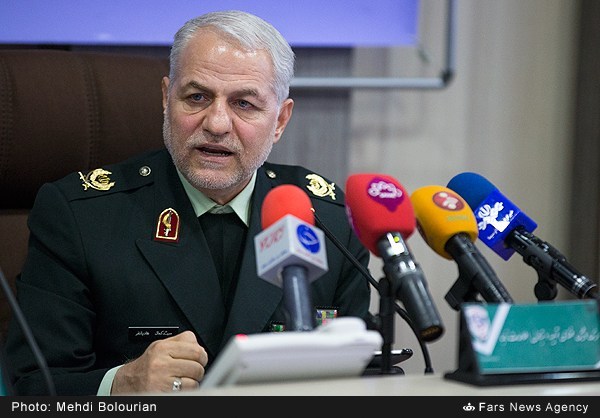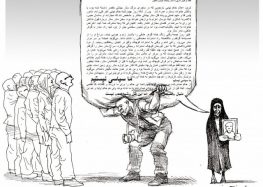Iran Cracks Down on Kurdish Activists After Anti-State Protests
 At Least Two Activists Facing “National Security” Charges
At Least Two Activists Facing “National Security” Charges
Iran’s cyber police, known as FATA, and the Intelligence Ministry have summoned rights activists in mainly Kurdish-populated provinces of the country and accused them of protesting against the state.
Some of the activists summoned in the western provinces of West Azerbaijan, Kurdistan, Kermanshah and Ilam are now facing national security charges, according to information provided to CHRI by three sources.
Fearing reprisals by state forces for speaking to a foreign media outlet, the sources spoke on the condition of anonymity.
Those charged include Ejlal Ghavami, the spokesman for the Human Rights Organization of Kurdistan, and Kurdish civil rights activist Dana Seyed-Abbasi.
Others who have been summoned include Sabah Hassani, Hashem Hesami, Hiva Yousefi, Soleiman Abdi, Mohammad Abedi, Ali Hosseini, Mozaffar Ebrahimpour, Hassan Mahmoudi, Ata Rahmanzadeh, Loghman Ghoreishi, Hajir Sharifi, Jiar Vahidi, Yaser Ahmadi, Mahmoud Jabbari, Hamdollah Karsaz, Amin Jedari and Habib Majidi.
“Ejlal Ghavami was summoned to the FATA office in Sanandaj [capital of Kurdistan Province] to answer questions about the protests in early January 2018 and anti-state posts on Telegram channels,” said one source.
“On March 25, Branch 1 of the Prosecutor’s Office in Kurdistan—based on a complaint from Basij-e Rasaneh—charged Ghavami with having ties and cooperating with channels opposed to the state and publishing falsehoods and illegal material, despite the fact that he and Dana Seyed-Abbasi work in the open and publish their criticisms and objections under their own name and have no ties to the alleged channels of Telegram,” he added.
Basij-e Rasaneh is the media arm of Iran’s Basij militia, the volunteer branch of the Islamic Revolutionary Guards Corps (IRGC).
“In a coordinated action, the FATA police and Intelligence Ministry offices in various cities in Kurdish-populated provinces of Iran began summoning many civil rights activists in late February,” added the source.
The source continued: “Some of them were accused of having ties with opposition channels. Others were summoned to the Intelligence Ministry offices and greatly pressured to avoid any activities and plans during Nowruz [Persian New Year) holidays [in March 2018].”
“Every year, civil rights workers hold Nowruz ceremonies in various cities but none of them were allowed to do it this year,” said the source. “The authorities designated their own places for holding ceremonies approved by the state. We’ve never had this problem before. This was the first time. It’s an unlawful precedent. They even banned us from organizing Nowruz events in the villages.”
Another civil rights activist who was summoned to the Intelligence Ministry’s office in the city of Ilam, the capital of Ilam Province, told CHRI that he was told the Nowruz events were un-Islamic.
“For the past several years during Nowruz, Kurdish civil rights activists have organized campaigns known as ‘Khaki-pooshi” [“wearing khaki clothes”], calling on Kurdish people to attend with khaki Kurdish clothes. The main objective is to unify the Kurdish people but at the Intelligence Ministry’s office, they said these events are against Islamic traditions and they would take strong action against them,” the source told CHRI.
A third civil rights activist who was recently summoned and questioned at the FATA office in Kermanshah, the capital of Kermanshah Province, denied having any ties with anti-state social media networks.
“I have never had any connection with Kurdish or non-Kurdish Telegram channels opposed to the state but the authorities paid no attention to my explanations and said they would file a case against me after the New Year [March 20],” said the source.
After being questioned at the FATA office in Sanandaj, a Kurdish civil rights advocate told CHRI: “They behaved very badly. They wouldn’t let me explain anything. They were trying to make me accept their accusations. They said I had disturbed public opinion and published falsehoods by giving information to foreign-based channels on Telegram about the protests in early January 2018. They said I should expect a summons to face charges in court in Sanandaj. It’s not just me, many others have also been summoned.”
Local residents Saro Ghahremani and Kianoosh Zandi went missing on January 2, 2018, amid protests in Sanandaj. On January 13, agents of the Intelligence Ministry delivered their bodies to their families, claiming the young men had died in a shoot-out with security forces.
“What the Islamic Republic has said about them is complete lies,” said local civil rights activist Mokhtar Zarei in an interview with CHRI on January 22. “They were not armed, they were not members of any political party and they did not get killed in an armed confrontation.
“They had no weapons to engage in an armed confrontation,” he added.


